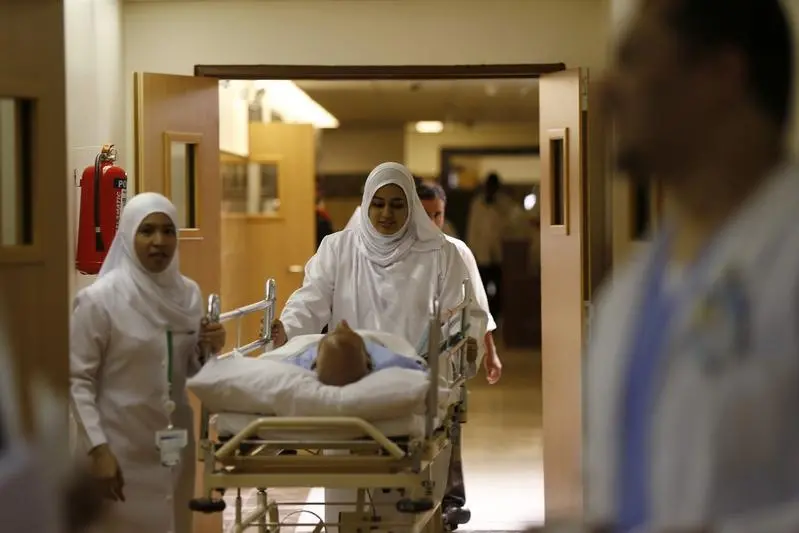PHOTO
24 June 2016
Jeddah - The director of public administration for infection control at the Ministry of Health, Hayel Al-Abdali, said the accusations against the ministry of negligence in dealing with MERS cases is "unrealistic." He was responding to a World Health Organization (WHO) statement that an error in the diagnosis of a patient in a Saudi hospital exacerbated the MERS crisis in the country.
Al-Abdali said his ministry was in constant contact with the WHO and provided it with ongoing reports of emerging MERS cases, stressing that the ministry has applied a strict system for more than a year and half to track hospitals and their preparations.
"We have hundreds of thousands of patients, and so it is possible to have a situation where these strict measures are not applied due to lack of usual symptoms on the patient, and this may have caused a spread of the virus," he said.
"However, it is noticeable that the latest outbreak at King Khaled University Hospital is one of the outbreaks that were controlled and ended because it was contained in a hospital wing due to the rapid action by the hospital administration and the Command and Control Center."
"Those who mixed with the patients were isolated quickly, and no cases were reported on Tuesday," he explained, noting that based on current indicators, there is complete control of MERS in that hospital.
He said the performance of rapid response teams became effective in facing possible outbreaks in hospitals, as has the response of hospitals.
"MERS is linked to the community in Saudi Arabia, the environment (camels) and exposure, and some patients develop it and move on to hospitals, where there is a fertile environment for transmission because of overcrowding in emergency departments, especially since some symptoms are still not clear and may resemble the flu or bacterial pneumonia," he explained.
He said in Saudi Arabia, more than 450 health facilities and hundreds of thousands of health practitioners, no matter how hard, cannot be working fully and accurately 100 percent of the time. However, for example in South Korea, one cases resulted in the spread to 186 other cases, which is far more than in Saudi Arabia.
He attributed the sporadic cases of the coronavirus during Ramadan to the high rate of consumption of camel meat, especially during meat preparation before cooking when preventative measures are not taken, but noted that there is no scientific proof.
He stressed the importance of taking preventative measures and dealing seriously and cautiously with camels and camel meat, especially before cooking, in order to minimize new infections.
Jeddah - The director of public administration for infection control at the Ministry of Health, Hayel Al-Abdali, said the accusations against the ministry of negligence in dealing with MERS cases is "unrealistic." He was responding to a World Health Organization (WHO) statement that an error in the diagnosis of a patient in a Saudi hospital exacerbated the MERS crisis in the country.
Al-Abdali said his ministry was in constant contact with the WHO and provided it with ongoing reports of emerging MERS cases, stressing that the ministry has applied a strict system for more than a year and half to track hospitals and their preparations.
"We have hundreds of thousands of patients, and so it is possible to have a situation where these strict measures are not applied due to lack of usual symptoms on the patient, and this may have caused a spread of the virus," he said.
"However, it is noticeable that the latest outbreak at King Khaled University Hospital is one of the outbreaks that were controlled and ended because it was contained in a hospital wing due to the rapid action by the hospital administration and the Command and Control Center."
"Those who mixed with the patients were isolated quickly, and no cases were reported on Tuesday," he explained, noting that based on current indicators, there is complete control of MERS in that hospital.
He said the performance of rapid response teams became effective in facing possible outbreaks in hospitals, as has the response of hospitals.
"MERS is linked to the community in Saudi Arabia, the environment (camels) and exposure, and some patients develop it and move on to hospitals, where there is a fertile environment for transmission because of overcrowding in emergency departments, especially since some symptoms are still not clear and may resemble the flu or bacterial pneumonia," he explained.
He said in Saudi Arabia, more than 450 health facilities and hundreds of thousands of health practitioners, no matter how hard, cannot be working fully and accurately 100 percent of the time. However, for example in South Korea, one cases resulted in the spread to 186 other cases, which is far more than in Saudi Arabia.
He attributed the sporadic cases of the coronavirus during Ramadan to the high rate of consumption of camel meat, especially during meat preparation before cooking when preventative measures are not taken, but noted that there is no scientific proof.
He stressed the importance of taking preventative measures and dealing seriously and cautiously with camels and camel meat, especially before cooking, in order to minimize new infections.
© Arab News 2016





















